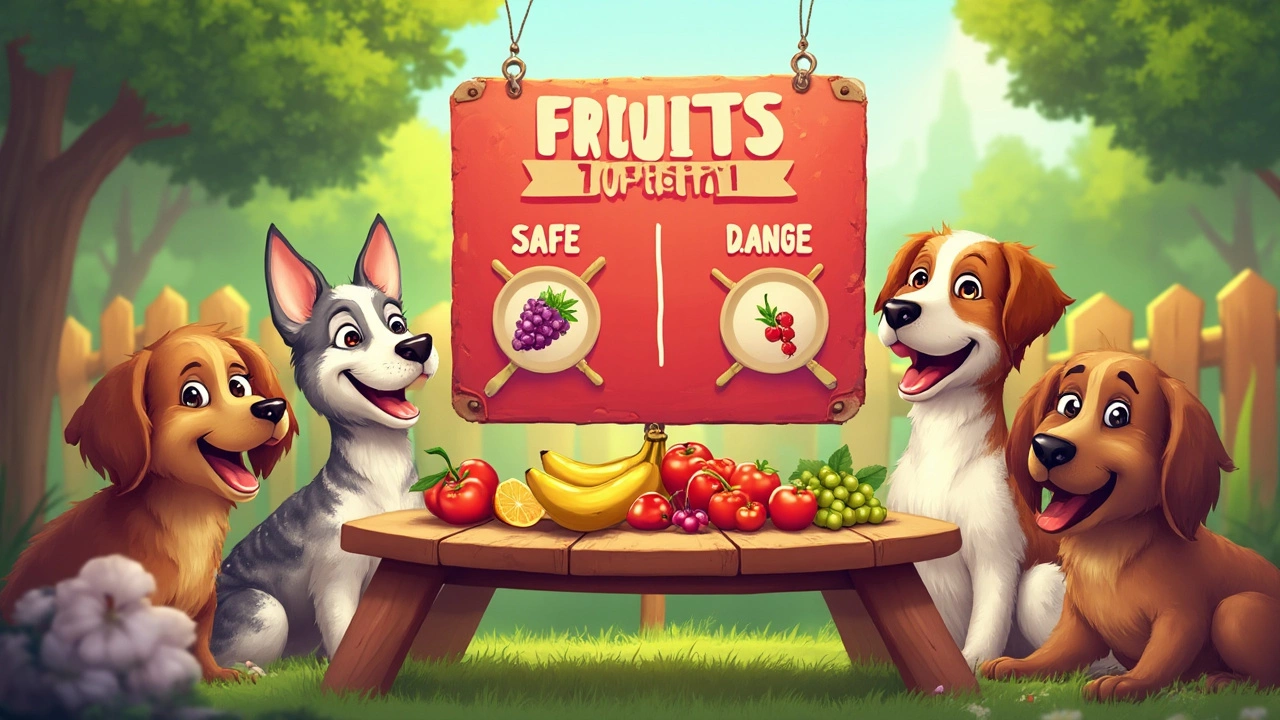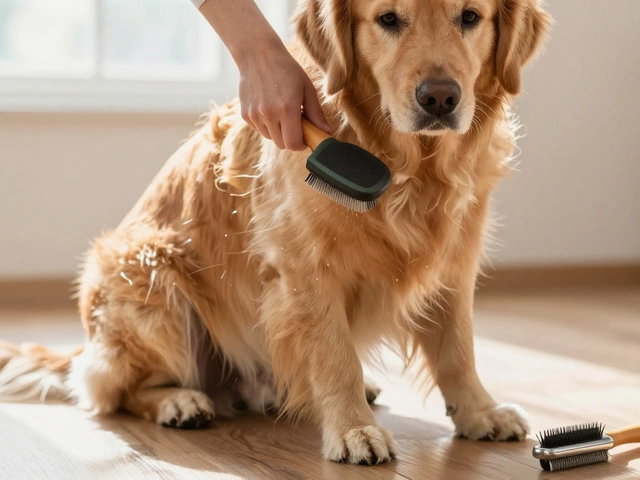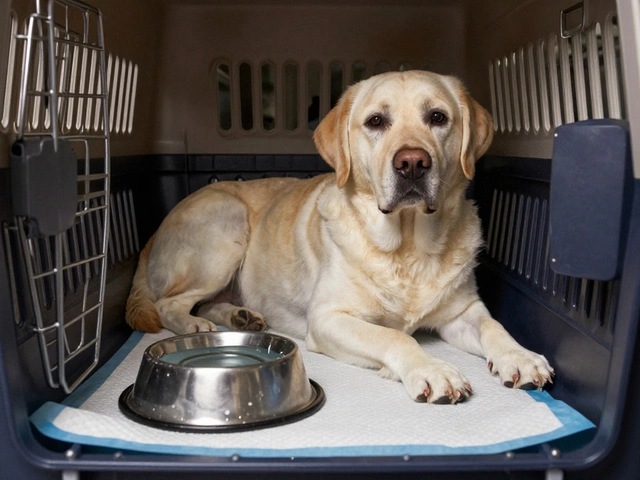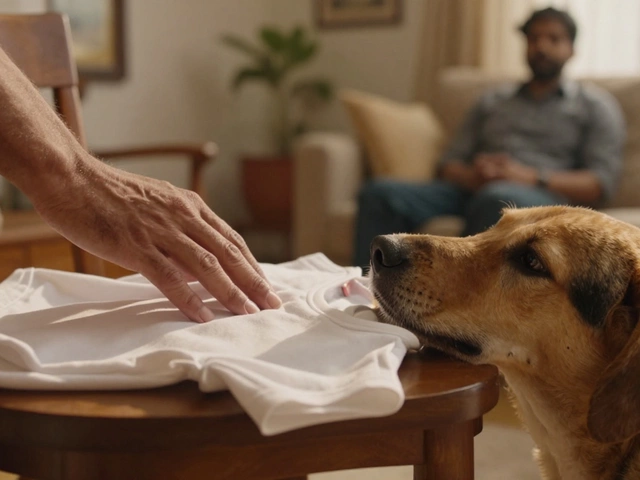
Dogs often seem interested in whatever we're munching on, but not everything in our fruit basket is safe for them. You're probably thinking, aren't fruits supposed to be healthy? Well, the answer is mostly yes, but there are fruits you should keep away from your dog.
For starters, grapes and raisins can be super dangerous. Yeah, those tiny little morsels might seem harmless, but they can cause kidney failure in dogs. And no, it doesn't take a lot of them to cause serious trouble.
- Fruits that are a No-Go
- Why Grapes and Raisins Are Dangerous
- The Avocado Debate
- Cherry Pitfalls
- Citrus Concerns
- Safeguarding Your Dog's Health
Fruits that are a No-Go
When it comes to feeding our canine buddies, not all fruits are equal. Some fruits can actually be harmful, so it's crucial to know which ones to avoid.
First up, grapes and raisins. While they're small and easy to drop, even a tiny amount can lead to kidney issues for dogs. There’s no clear understanding of why, but the danger is real, and vets advise keeping them out of paw's reach.
Next on the list is avocado. While avocados are seen as superfoods for humans, they contain persin, which can be toxic for dogs, causing vomiting and diarrhea.
Cherries are another fruit that’s best kept away. It’s the pits, stems, and leaves that are problematic because they contain cyanide. Plus, the pits pose a choking hazard.
Citrus fruits like lemons and limes can irritate your dog's tummy. The citric acid can lead to digestive discomfort, and in larger amounts, cause serious issues with the nervous system.
Let’s not forget about fruits like plums and peaches. Similar to cherries, their pits contain cyanide, which is no bueno for pooches. The pits can also cause intestinal blockages.
In a nutshell, while fruits are generally healthy for humans, some of them pose risks to dogs. Keeping a close eye on what you’re sharing from your kitchen can make all the difference in keeping your dog safe.
Why Grapes and Raisins Are Dangerous
You might be surprised to hear this, but grapes and raisins can be downright toxic for dogs. What makes it tricky is that not every dog will react the same way, and experts aren't entirely sure why it happens. However, it's clear that these fruits can cause severe reactions, and sometimes it doesn't take much at all.
The most alarming issue with grapes and raisins is their potential to cause acute kidney failure. Imagine that—a small handful could jeopardize your pup’s kidneys. We're talking symptoms like vomiting, lethargy, and even a loss of appetite just hours after digestion. If not treated quickly, it could lead to more serious problems.
Here's a quick overview of what could happen:
- Vomiting and Diarrhea: Sometimes even within a few hours.
- Loss of Appetite: Your dog might refuse food and water.
- Lethargy and Weakness: Lack of usual energy.
- Abdominal Pain: Indicated by whining or restlessness.
If you think your dog has snuck a few grapes or raisins, get in touch with a vet pronto. They'll likely recommend inducing vomiting to prevent absorption.
It's not just fresh grapes; any form—like wine, juice, or even baked goods with raisins—should be off the menu. It'll save you a lot of heartaches and, more importantly, keep your dog out of harm's way.
The Avocado Debate
The whole discussion around avocado and dogs can get a bit confusing. On one hand, avocados are packed with healthy fats and nutrients, which is great for us humans. But for our canine pals, it’s a different story.
The main issue with avocados for dogs is a substance called persin, found in the leaves, skin, and pit. While dogs aren’t as sensitive to persin as some other animals, it can still cause an upset stomach, and not in a fun way. Ingesting the pit can also be a choking hazard or lead to an intestinal blockage. If you're anything like me, you probably don't want to deal with an emergency vet visit over guacamole ingredients.
So, what's the bottom line? It’s mainly a risk vs. reward situation. Keeping avocados out of your pet food regimen is usually the safer play. Dogs can get their fats and nutrients from other safer foods without the persin risk hanging over their heads.
If you're really curious about what makes your dog's diet click, a chat with your vet is always a good idea. They can suggest alternatives that are both safe and nutritious, keeping that tail wagging strong.

Cherry Pitfalls
Cherries might look like they’re just juicy treats, but when it comes to dogs, they're more trouble than they're worth. The most glaring danger is the cherry pit. Those little hard stones inside are a chocking hazard, but there’s more to it than that. They contain cyanide, which is obviously not something you want your dogs ingesting. Even though your pup would need to eat a lot to experience serious harm, why take the risk?
Whole cherries also pose a risk if a dog happens to gulp them down without chewing. The pits can get lodged in their digestive tract, causing blockages and discomfort.
If you can't resist sharing this fruit with your furry buddy, make sure to remove the pit and stem completely. And remember, even if you remove the pit, cherries can lead to an upset stomach in some dogs, so moderation is key.
It's not all gloom and doom if a dog accidentally snags a cherry from your snack bowl, but be observant. Symptoms of cyanide poisoning include difficulty breathing and red gums. Noticed anything similar? That’s a signal to hit up the vet pronto.
Citrus Concerns
So, what's the deal with citrus? You might love squeezing a lemon or popping an orange segment, but for your dog, it's a different story. Citrus fruits like oranges, lemons, and limes are best avoided for your pooch.
Here's why: Citrus fruits contain essential oils and a compound called psoralen, which, if consumed in large amounts, might cause stomach upset for your dog. Think vomiting and diarrhea – not fun for anyone involved.
Is it all doom and gloom with citrus? Not entirely. Some folks let their dogs nibble on small orange pieces, saying their pups love the taste. However, limiting it to a few bites is wise because too much can lead to those nasty symptoms.
Let's keep it simple:
- If you're sharing, do it in moderation and without the peel.
- Watch for any adverse reactions after your dog has had some.
- Keep citrus goodies stored out of paw's reach to avoid unplanned snacks.
When it comes to keeping your dog safe, staying informed makes all the difference. Turning to safe alternatives when you're unsure can save you and your furry friend from unwanted trips to the vet.
Safeguarding Your Dog's Health
Keeping your dog safe from harmful fruits is an important part of their overall well-being. Knowing what they should avoid is just the start. Here are some practical steps to help ensure your dog stays healthy and happy:
- Know What's Unsafe: Be aware of the fruits that are harmful, like grapes, raisins, and cherries—and keep them out of your dog's reach.
- Watch for Signs: Dogs are sneaky and might get into things they shouldn't. If you suspect your dog has eaten an unsafe fruit, watch for symptoms like vomiting, diarrhea, or lethargy. Contact your vet immediately if anything seems off.
- Safe Fruit Alternatives: Stick to fruits that are generally safe like apples (without seeds), blueberries, and watermelon. Always use moderation—it’s key to making sure your pet stays in top shape.
Sometimes it just makes sense to think of your dog’s health in terms of numbers. Did you know that just a small handful of raisins could lead to life-threatening issues for your dog? That's why it’s super important to pay attention to what they eat.
To make things easier, keep a list of 'safe' and 'unsafe' fruits on your fridge or phone. It’s a small act, but it can make a big difference. Always remember, when in doubt, consult your vet. They can provide insights tailored to your dog’s needs.




